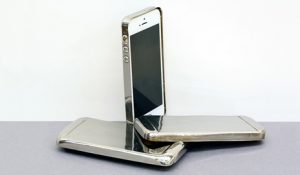By Jim Shelton, Yale News
September 4, 2014

According to Yale researcher Jan Schroers, This material is 50 times harder than plastic, nearly 10 times harder than aluminum and almost three times the hardness of steel.”
Someday, digital citizens around the world may have a Yale professor to thank for the supercool, extra-durable case protecting their smartphones.
Jan Schroers, who teaches mechanical engineering and materials science, has created a thin, lightweight smartphone case that is harder than steel and as easy to shape as plastic. Schroers developed the technology for the cases in his Yale lab; now he’s ready for a partner to bring the product into mass production.
“This material is 50 times harder than plastic, nearly 10 times harder than aluminum and almost three times the hardness of steel,” Schroers said. “It’s awesome.”
For years, academic and commercial institutions have sought an effective technique for shaping these bulk metallic glasses (BMGs) — a new generation of strong-yet-pliable materials. Electronics casings, in particular, have been identified as a desirable application. Yet past attempts at finding a shaping process were unsuccessful.
At Yale, Schroers spent much of the past decade pursuing a fundamentally different approach to precisely shaping complex geometries. Instead of melting the BMG material and forcing it into a mold at high temperatures, he utilized a unique, supercooled liquid state for the material, in which the BMG softens sufficiently to allow for shaping. With this technique, which Schroers calls thermoplastic forming, BMGs can be shaped like plastics. As a consequence, thermoplastic forming BMGs don’t require massive amounts of energy.
From there, Schroers focused on producing BMGs in sheets. That form, he reasoned, is the most conducive to practical, manufacturing applications. “Developing a fabrication method for BMG sheets has been extremely difficult because it requires a fundamentally different process,” Schroers said. “We succeeded recently, with a surprisingly versatile process that is fast, precise, and economical.”
Read more
